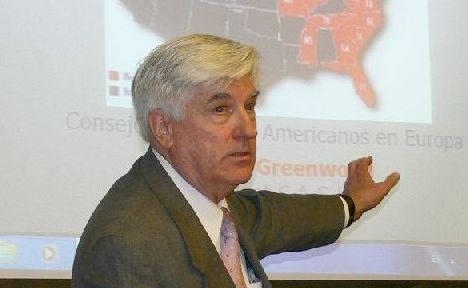Bruce R. Greenwood, Director of CASE and representative of the Commonwealth of Massachusetts

Mr. Greenwood, for how long has this Council been working?
The Council was created in 1971. Massachusetts opened an office in 1992, much later, 20 years after the founding of CASE; and we joined the organization and have been with CASE ever since. I’ve been with CASE and Massachusetts. I wear two hats: one representing CASE, another representing the state of Massachusetts, or Commonwealth of Massachusetts, as you say, and that started in 1993.
Which are the main objectives of CASE in Europe?
The total name is the Council of American States in Europe and we abbreviated CASE because when you have a title so long, such as Council of American States in Europe, no one wants to say it. So, we go by CASE. Our goals are to provide a point of contact, a person that you can speak with in Europe. You do not have to contact the United States if you are interested in any of the states in our organization, which are currently 15 states locates in the Eastern portion of the United States with Europe orientation. We provide that contact for a company that is interested in market access or expansion in the American market, and once again, a contact in Europe. We provide initial information, answering questions and identifying potential partners for those wanting to establish or expand business in the United States.
Why only 15 states? Is it because there other states don’t want to add to this council or because these were the only ones?
I think that it’s unfortunate that Americans, unlike the Spanish firms and the Spanish government, are not really as internationally oriented as Europeans. So you have many states that just do not see the value of that kind of outreach. We had many more members earlier on, but since financial difficulties have struck, political changes with more conservative governments that do not outreach internationally. We’ve gone from well over twenty now down to fifteen members. It’s more a question of political disposition in sort of the world view of Americans as opposed of the world view of Europeans, and in this case also Spanish people.
In your opening address, you said that most of the companies in the United States were medium-sized companies; that they would be able to establish trade relations with Europe?
When you have a country as big as the United States and with big names like McDonald’s or General Electric and so on, that are very active internationally, I think the impression in Europe and in other parts of the world is that that’s all we have in America, these large corporations that reach out. But, if you look at the American economy, over 80 percent of companies employ fewer than ten persons. So, you really have small and medium size firms and what many of our members do, member in CASE, is work with these small firms to export into Europe; and we work with European firms. However small, they are better interested in establishing a formal presence in the United States. And usually that’s a sale in marketing office. It’s something fairly small that might lead to something larger: a warehousing or an after-sale service office; but you should start with one step at a time and we realized that the smallest starts in long term produce also very good benefits.
Which do you think the best fields for investment in the United States are, or to trade and have commercial relations with Europe?
I think there are really numerous sectors. The largest percentage of Spanish firms investing in the United States are in manufacturing, but there are many wholesale trade, chemicals and other fields, services of all kinds. I think that what I’d suggest the Spanish firm should do is contact one of our members or contact CASE and say “this is what I do”. I just spoke to a person who has a winery. They export wine to the United States. They are interested in establishing a formal presence. So, it could be just about any field and if we think that it does not work, then we will say so. But we will definitely have a dialogue with the Spanish firm. I think basically it all starts with the first question.
The ambassador to the United States, Mr. Salomon, said that he has confidence that Spain could go out of the economic hole, where we are in this very moment. What do you think about that perspective?
I think he’s absolutely correct. The Spanish firms are investing in the United States. That creates jobs in Spain. It’s not really a question of the Spanish, but much like American firms that establish cheaper manufacturing levels, say, in China. That’s not what we’re talking about here. The transatlantic commercial relationship is very different. So, we would argue, we would say that for Spanish firms, British firms or French firms investing in the United States, that would create jobs back home in producing, in expanding market internationally for that company, for the prospect for further goals. Most trade and goods is trade within corporations that have established something and are trading their own product back and forth to supplying parts. The first step to establish a presence can benefit Spanish firms and if you look at what countries in Europe right now are doing quite well, those are the countries that are exporting a great deal.
Both Spain and the United States are tourism countries. They still have a lot of potential in tourism. Yours is one of the countries that receive more tourists in the world. Do you think that it is possible to increase the exchange of tourists from both parts?
Yes. Actually we have had that question come up in the past and what I have told people back home in Massachusetts, and I think other state representatives have done the same, is when you think of the Spanish language, most Americans would think about Mexico and Latin America. So, don’t think about Mexico and Latin America. Think about Spain –the language originated in the country of Spain- and what Spain has to offer. We’re trying to build bridges with universities also, because if young students come to learn Spanish in Spain and not somewhere in Latin America, let us say, they want to immerse themselves in that culture and speak that language, well, then they should come to Spain. What that would produce over time is when they think as tourists, they would return to Spain. And when they think of setting up business, they would think about Spain and so on. We work at that level too, with first impressions and how we can bring more students into that mix as well.
What is your impression of this visit paid by the Council to Spain?
Very good, and this is just the first day. We’re here today and tomorrow and we’ve worked with this now for seven years. We started in 2005, this is our eighth visit. One impression that most Americans have about Spain is that it is a beautiful place for tourism, great food, good wine, friendly people; but what we’ve also learned is that there is high-tech sectors in Spain that is extremely important for the development of Spain and that can greatly benefit the United States. So, we continuously explore that aspect as well. The sectors are interesting for both of our economies.














